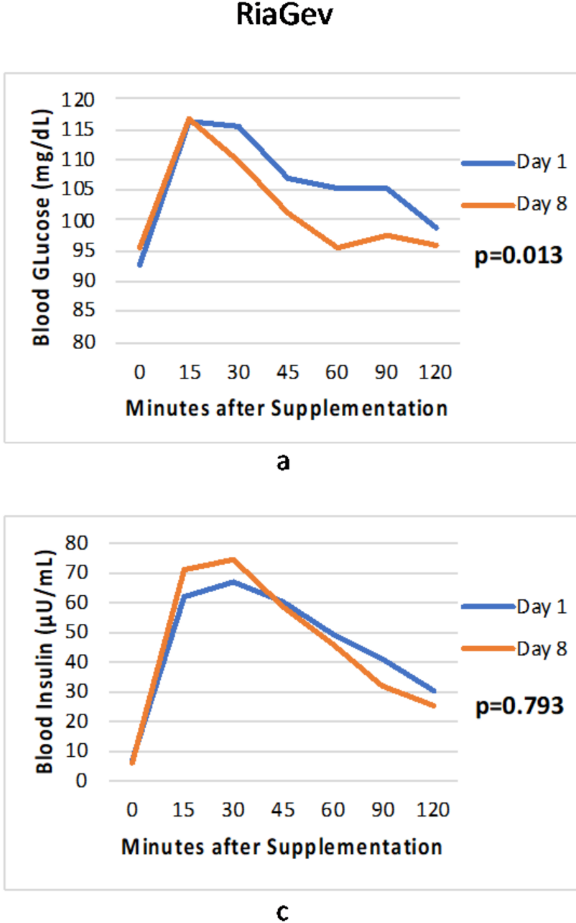Study Shows the Combination of Nicotinamide and D-Ribose Improves Insulin Sensitivity
The nicotinamide and D-Ribose combination RiaGev increases NAD+, improves insulin sensitivity, and lowers the stress hormone cortisol in healthy, middle-aged adults.
Highlights
- Nicotinamide and D-ribose supplementation significantly increases blood NAD+ and NADP levels, along with energy molecules ATP and ADP.
- The nicotinamide and D-ribose combination substantially diminishes blood glucose while preserving insulin levels, indicating an increased insulin sensitivity.
- Taking NAD+-boosting combination diminishes the stress hormone cortisol and increases the abundance of the antioxidant glutathione.
Molecules associated with nicotinamide adenine dinucleotide (NAD+) metabolism are essential for cell energy production. Not only that, but they serve as cofactors for enzymes that repair DNA damage and eliminate harmful reactive oxygen species to preserve cell health and longevity. This is why boosting NAD+ with supplements has become a hot topic in the aging community, especially with the NAD+ precursor nicotinamide riboside (NR). However, multiple studies have shown that NR degrades to nicotinamide and ribose in cells before being converted to NAD+. This has left researchers with the question of what benefits could come from bypassing NR and directly supplementing with nicotinamide and ribose (D-ribose).
Published in Nutrients, Raftery and colleagues from the University of Washington demonstrate that supplementing healthy middle-aged adults with two doses of RiaGev (1280 mg of D-ribose, 240 mg of nicotinamide, and 480 mg of palm oil) per day significantly increases blood levels of NAD+ and other molecules associated with NAD+ metabolism called NADP+ and ATP. What’s more, RiaGev lowers blood glucose while leaving insulin levels unaltered, suggesting that RiaGev improves insulin sensitivity. RiaGev also increases blood levels of the antioxidant glutathione and reduces salivary levels of the stress hormone cortisol. These findings provide some of the first evidence that boosting NAD+ with RiaGev confers benefits other than increasing cell energy, such as boosting antioxidant activity and suppressing stress hormones.
The Combination Significantly Increases Blood NAD+ Levels and Boosts Insulin Sensitivity
Raftery and colleagues measured NAD+ blood levels from participants over an eight-day RiaGev administration regimen. They found that, at day five, NAD+ levels increased 10.4%, while the higher-energy verison of NAD+, NADP increased 27.6%. NAD+ and NADP are used to shuttle electrons between cell energy-generating reactions, ultimately resulting in the production of cellular energy called adenosine triphosphate (ATP). When ATP is utilized for energy, it is broken down to adenosine diphosphate (ADP). The research team found a higher abundance of the two energy molecules (ATP + ADP) five days into supplementation. These findings provide evidence that boosting NAD+ with RiaGev increases cell energy.
A previous clinical study showed that the NAD+ precursor nicotinamide mononucleotide (NMN) increases insulin sensitivity in prediabetic women. However, no study to date has shown that NR has an effect on insulin sensitivity. Therefore, Raftery and colleagues performed measures of insulin sensitivity.. The team found that after eight days of supplementation with RiaGev, the participants blood glucose levels significantly declined while blood insulin levels remained the same up to 120 minutes after supplementation. Less glucose in the blood with the same amount of insulin suggests that cells are more sensitive to intaking glucose. These findings suggest that RiaGev enhances insulin sensitivity in middle-aged adults.

Very few clinical trials the effects of NAD+-boosting supplements on antioxidant proteins. For this reason, Raftery and colleagues measured the abundance of the antioxidant glutathione from the blood of participants following RiaGev supplementation. The research team found that at day five of RiaGev supplementation, blood glutathione levels rose by 11.6%. These results illustrate that boosting NAD+ in humans can improve cell health by boosting the presence of the antioxidant glutathione which eliminates harmful reactive oxygen species from cells.
NAD+ Boosting Molecules Like RiaGev Improve Physiological Parameters for Healthy Aging
One of the primary findings of this study showing that RiaGev boosts insulin sensitivity has not been replicated using NR, so it is possible that supplementing with the RiaGev formulation (nicotinamide and D-ribose) confers benefits not seen with NR. Along those lines, this study is the first to show that supplementing with an NAD+ precursor increases blood ATP levels along with the antioxidant protein glutathione, while suppressing the stress hormone cortisol. For these reasons, the study provides invaluable physiological data demonstrating that NAD+ supplementation potentially confers health benefits that improve the number of healthy years we live and possibly extend lifespan.
Model: Human (between 36 and 65 years old)
Dosage: Two RiaGev tablet treatments daily containing 1280 mg of D-ribose, 240 mg of nicotinamide, and 480 mg of palm oil

